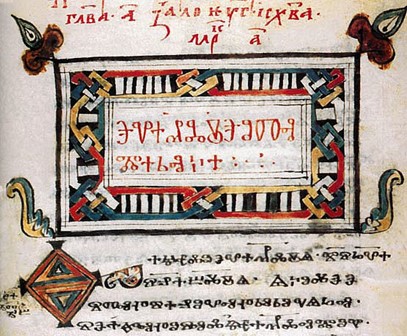Feast Day: February 14th
ⰵⰲⰰⰳⰳ[ⰵ]ⰾⰻⰵ ⱁⱅⱏ ⰿⰰⱃⱏⰽⰰ
Got that? If not, fear not, it is simply the familiar phrase: “The Gospel according to St. Matthew.” On the scanned page below you can see these letters, as they were written by a scholar or monk in the 10th century! (This amazing parchment manuscript contains all four Gospels and was discovered in the Zograf (a Bulgarian) Monastery on Mt. Athos, on an island off the Northeast coast of Greece. There are dozens of ancient Orthodox monasteries on the island, in 1843, this page was discovered after centuries of being protected and treasured. It now resides in the National Library of Russia, in St. Petersburg, and remains one of the oldest extant texts we have in Glagolitic.
You haven’t heard of Glagolitic? Well, I hadn’t either until I began to study our saints this week: Sts. Cyril and Methodius. You have probably heard of Cyrillic, which is an alphabet still used throughout Eastern and Southern Slavic territories (this means it is used in many different languages: including Slavic, Turkic, Mongolic, Uralic, Caucasian and Iranic-speaking countries from Eastern Europe all the way through parts of Eastern Asia). There are dozens of languages, from Russian and Macedonian, to Azerbaijani and Tatar, to Mongolian and Aleut (yes, that’d be people living on the Aleutian islands!) that use this alphabet. All those different groups read a write in a script developed from Glagolitic, which was invented by Sts. Cyril and Methodius.
Cyril and Methodius were actually baptized Constantine and Michael in Thessalonika, to a family who were movers and shakers in realms of politics and governance (to describe this a bit: their father, Leon was in charge of the military, and their uncle, Theoctistos, was in charge of international diplomacy … and the postal service). The boys would have learned Slavic and Greek growing up in the 820s and 830s, and Constantine would have learned Arabic and Hebrew during his university studies in Constantinople. With that background, these young men found themselves, almost without trying, at the intersection of politics and philosophy, diplomacy and theology. And this should be emphasized: they were not gunning for worldly influence, their dream was definitively in the spiritual realm, and yet they took the tremendous skills that they did have in the political and intellectual realm, and put it to use for the Gospel.
In 860 the brothers head to Khagan, at the behest of the Emperor (Michael III) and Patriarch of Constantinople (Photius) to offer Christianity to the Khazars. They would be asked to do the same two years later in Great Moravia, at the request of Prince Rastislav, because his people were wanting to receive the Gospel for themselves, not depending on the Germanic neighbors to the north, who would only teach and catechize in Latin. I am imagining receiving an email along these lines from one of our parishes: “Fr. Dominic, could you come and preach a parish mission for us next year? Oh, you should know, we speak a language you have never heard, and for which there is no alphabet for reading, or writing. Grateful for your yes, Prince Rastislav.” Can you imagine?! Yet that is the situation faced by Constantine and Methodius (and, I should mention, many missionaries from (Methodius, by this time, had received tonsure and his religious name. Constantine would receive his a few years later after making a trip back to Rome before his death in 869. It should also be mentioned that it was during that final trip to Rome that the brothers received official permission from Pope Adrian II to continue to celebrate the Mass and Sacraments in Slavic, with the Glagolitic alphabet.)
And so it happened: the two brothers said yes, went to Moravia, invented a new alphabet, translated the Gospels, the Liturgical texts, and canon law into the new language, converted many souls to following Jesus, received the usual share of persecution from within and without of the Church, and died after a few years of tremendous work, leaving behind thousands of Christian people, who would pass their faith, and language, onto millions that would descend from them in the thousand years hence. In those peoples, these brothers are often given the title “Equal to the Apostles” for the efforts they made in the proclamation of the Gospel, and Pope St. John Paul II named them co-patrons of Europe (alongside of Sts. Benedict of Nursia, Bridget of Sweden, Catherine of Sienna, the Teresa Benedict of the Cross).
– Fr. Dominic Rankin was continuously humbled to merely study the faith in a foreign language (Italian). He has not tried to invent his own language since he was about two years old, and will not do so again until the Holy Spirit either gives him the gift of tongues, or asks him to do so with his own efforts … Then again maybe it is a perennial challenge of all Christians to translate, so to speak, the Gospel into the language of our neighbors. Hasn’t Jesus always stretched our limited means of communication and argumentation? Hasn’t it always been difficult to pass onto another person a real encounter with Jesus, Whom we know and love?
